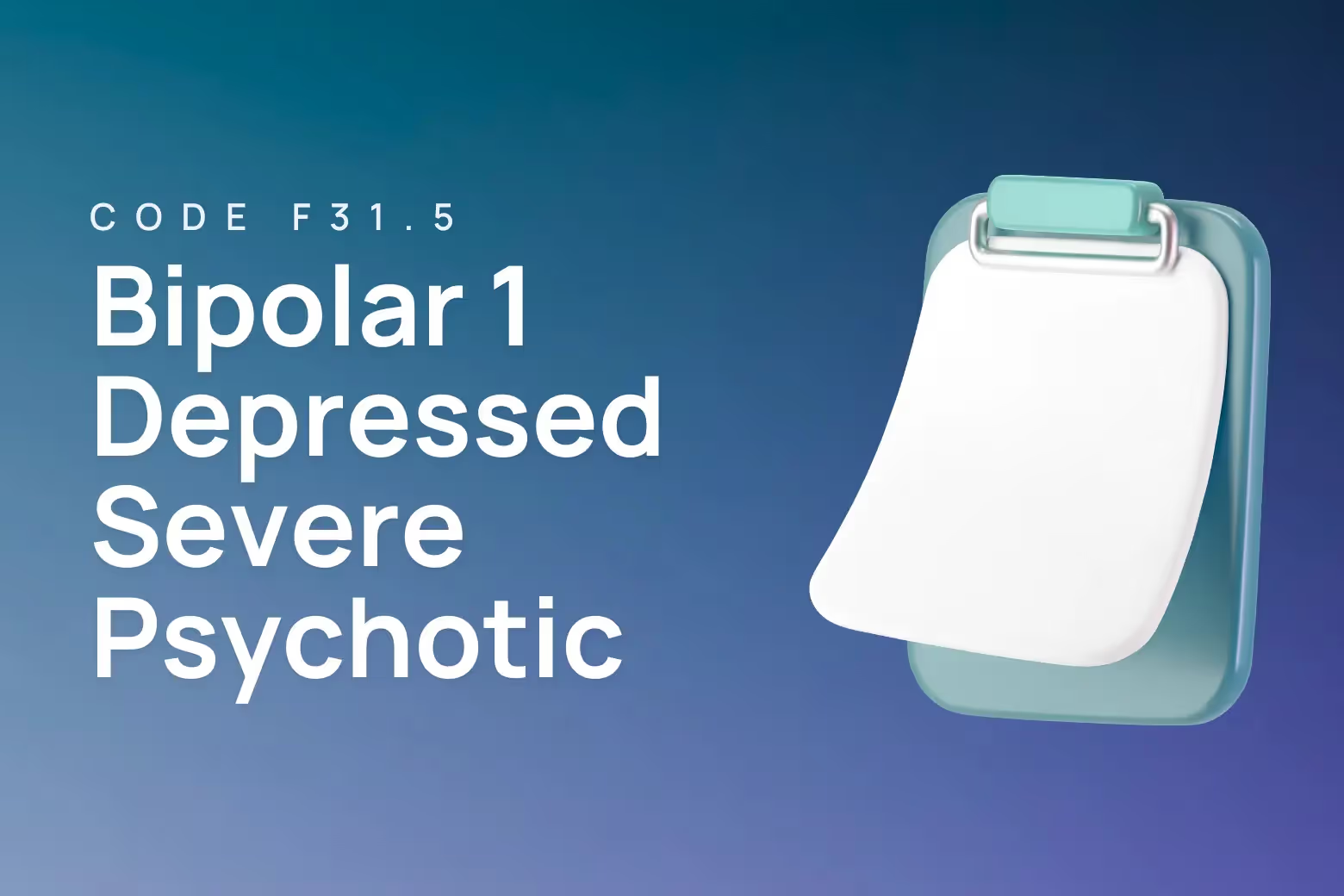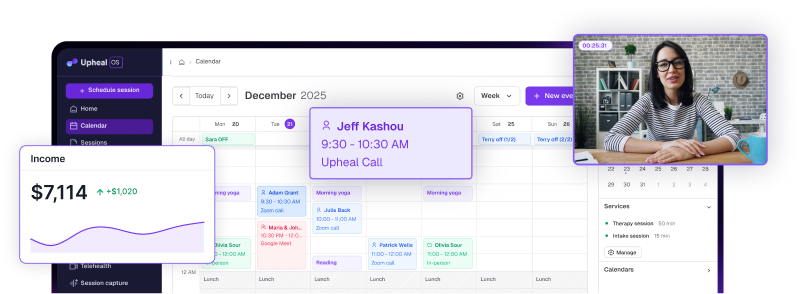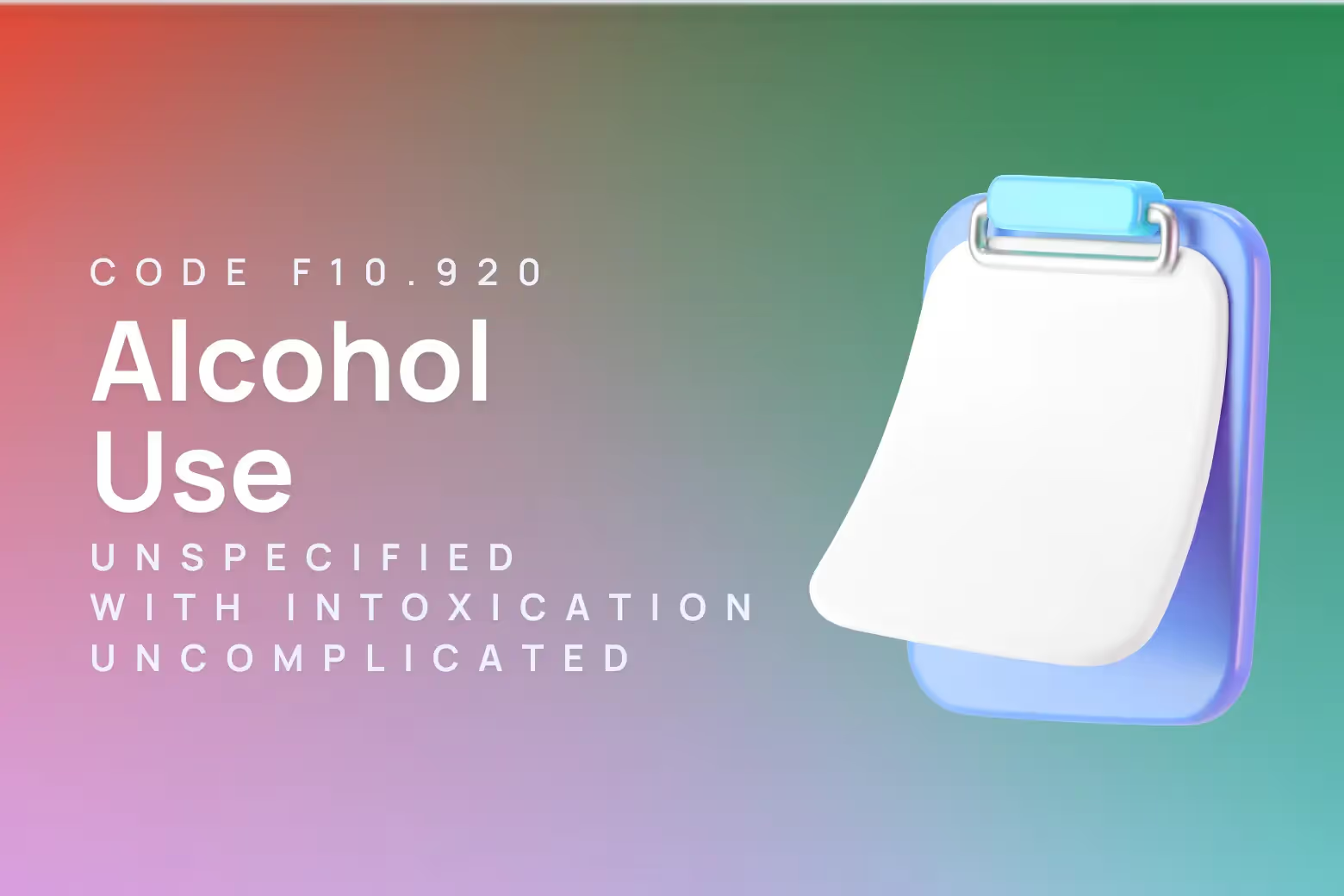ICD-10 code for bipolar disorder, current episode depressed, severe, with psychotic features

F31.5 is the ICD-10 code for bipolar disorder, current episode depressed, severe, with psychotic features. This diagnosis applies when someone with established bipolar disorder is currently experiencing a major depressive episode of severe intensity that includes hallucinations, delusions, or other psychotic symptoms.
Accurate coding of F31.5 ensures appropriate treatment authorization and enables clinicians to access the specialized interventions these clients need during this critical time.
Key takeaways
- F31.5 requires both severe major depressive episode criteria and the presence of psychotic features
- Psychotic features can be mood-congruent (themes of guilt, worthlessness) or mood-incongruent (unrelated content)
- This diagnosis indicates more severe illness requiring intensive treatment and close monitoring
- Evidence-based interventions include mood stabilizers, antipsychotics, and specialized psychotherapy approaches

Diagnostic criteria for psychotic depressed bipolar episodes (F31.5)
To assign F31.5, clinicians must first establish a bipolar I disorder diagnosis, which requires at least one lifetime manic episode lasting seven days or requiring hospitalization. The current major depressive episode must meet criteria for five or more symptoms present nearly daily for at least two weeks, including depressed mood or anhedonia, plus symptoms like significant weight changes, sleep disturbances, psychomotor changes, fatigue, feelings of worthlessness, concentration difficulties, or recurrent thoughts of death.
The severe specifier indicates that symptoms substantially exceed diagnostic requirements, are seriously distressing and unmanageable, and markedly interfere with social and occupational functioning. Additionally, psychotic features must be present during the current depressive episode.
Psychotic features may include hallucinations or delusions that can be either mood-congruent or mood-incongruent. Mood-congruent delusions typically involve themes of guilt, worthlessness, or deserved punishment that align with the depressed mood. Mood-incongruent psychotic symptoms involve content unrelated to typical depressive themes.
- Depressed mood most of the day, nearly every day
- Markedly diminished interest or pleasure in activities
- Significant weight loss or gain, or appetite changes
- Sleep disturbances (insomnia or hypersomnia)
- Psychomotor agitation or retardation
- Fatigue or loss of energy
- Feelings of worthlessness or excessive guilt
- Concentration difficulties or indecisiveness
- Recurrent thoughts of death or suicidal ideation
- Presence of hallucinations or delusions
- Symptoms cause severe functional impairment
When to use F31.5 diagnosis code
Clinicians must carefully distinguish F31.5 from similar presentations to ensure accurate coding and appropriate treatment planning.
F31.5 vs F31.4 (Severe non-psychotic depressed episodes)
F31.5 and F31.4 share the same depressive episode severity but differ critically in the presence of psychotic symptoms. While F31.4 represents severe depression without reality testing impairment, F31.5 includes hallucinations or delusions that further complicate the clinical presentation.
The presence of psychotic features in F31.5 typically indicates more severe illness requiring different treatment approaches. These clients often need antipsychotic medications in addition to mood stabilizers and may require higher levels of care or hospitalization for safety.
F31.5 vs F31.64 (Mixed psychotic episodes)
Both codes involve severe mood episodes with psychotic features, but F31.64 represents mixed episodes where manic and depressive symptoms occur simultaneously. Mixed episodes involve meeting full criteria for a major depressive episode while also experiencing at least three manic symptoms like elevated mood, grandiosity, decreased need for sleep, or increased goal-directed activity.
F31.5 represents purely depressive episodes without concurrent manic symptoms. The distinction affects treatment planning, as mixed episodes may respond differently to medications and require specific therapeutic approaches.
Related ICD-10 codes
- F31.0 - Bipolar disorder, current episode hypomanic
- F31.1 - Bipolar disorder, current episode manic without psychotic features
- F31.2 - Bipolar disorder, current episode manic with psychotic features
- F31.3 - Bipolar disorder, current episode depressed, mild or moderate
- F31.4 - Bipolar disorder, current episode depressed, severe, without psychotic features
- F31.6 - Bipolar disorder, current episode mixed
- F31.64 - Bipolar disorder, current episode mixed, severe, with psychotic features
Interventions and CPT codes for bipolar disorder
Psychopharmacological interventions
Clients with F31.5 typically require combination medication treatment including mood stabilizers and antipsychotic medications. Initial treatment may include lurasidone or cariprazine monotherapy, which have better metabolic profiles than quetiapine for bipolar depression. Lamotrigine monotherapy or lithium monotherapy represent additional first-line options.
If initial treatments prove ineffective, level two options include divalproex plus lurasidone or olanzapine plus fluoxetine for bipolar I disorder. The most severe cases may require electroconvulsive therapy when other interventions fail.
Medication management sessions are typically billed using:
- 90792 - Psychiatric diagnostic evaluation with medical services
- 90834 - Psychotherapy with medication management (45 minutes)
- 99213-99215 - Established patient office visits for medication monitoring
Individual psychotherapy
Cognitive behavioral therapy adapted for bipolar disorder helps clients recognize mood episode warning signs, develop coping strategies, and address the cognitive distortions that may accompany psychotic symptoms. Interpersonal and social rhythm therapy focuses on stabilizing daily routines and sleep patterns that are crucial for mood stability.
Individual therapy sessions use standard psychotherapy CPT codes:
- 90832 - 30-minute session
- 90834 - 45-minute session
- 90837 - 60-minute session
Family therapy and psychoeducation
Family involvement becomes especially important when psychotic symptoms are present, as family members need education about recognizing signs of relapse and when to seek emergency care. Family therapy addresses communication patterns and helps develop crisis intervention plans.
Family therapy billing depends on patient participation:
- 90846 - Family therapy without patient present
- 90847 - Family therapy with patient present
How Upheal helps clinicians document F31.5 ICD-10 diagnosis
Suggesting appropriate ICD-10 codes based on session content
Upheal's clinical documentation platform analyzes session content to identify key symptoms and presentations that align with specific diagnostic criteria. When clients describe severe depressive symptoms combined with psychotic features during bipolar episodes, the platform recognizes these patterns and suggests F31.5 as the appropriate code.
Maintaining HIPAA-compliant records with proper diagnostic coding
Comprehensive documentation for F31.5 requires careful attention to both depressive symptom severity and detailed descriptions of psychotic features. Upheal helps clinicians capture this complexity while maintaining consistency across sessions and ensuring all required elements are documented.
The platform tracks mood episode progression over time, helping clinicians monitor treatment response and adjust diagnoses as clinical presentations evolve. This longitudinal perspective proves especially valuable for bipolar disorder management.
Reducing administrative burden so you can focus on client care
Managing clients with severe depression and psychotic features demands intense clinical attention and frequent safety assessments. Upheal automates routine documentation tasks, allowing clinicians to dedicate more time to therapeutic interventions and crisis management.
Supporting clients with bipolar disorder
Recovery from severe depressive episodes with psychotic features requires comprehensive treatment that addresses both mood stabilization and reality testing concerns. Clinicians serve as essential guides during these challenging periods, providing safety assessment, medication coordination, and therapeutic support.
Modern healthcare demands create pressure to balance thorough documentation with quality patient care. The complexity of F31.5 presentations requires detailed record-keeping that captures both symptom severity and treatment response while maintaining focus on the therapeutic relationship.
Upheal is a clinical documentation platform that helps behavioral health providers maintain accurate diagnostic coding while preserving the time and attention needed for complex cases. By simplifying administrative tasks, clinicians can focus on delivering the specialized care these clients need during their most vulnerable moments.
Ready to spend more time supporting your clients and less time on paperwork? Try Upheal free and experience how good documentation tools can improve both clinical outcomes and provider satisfaction.












